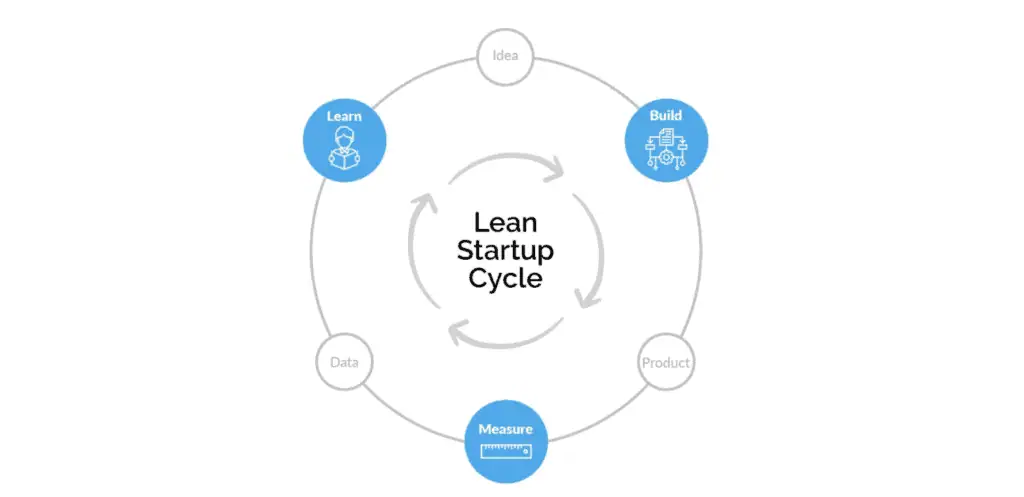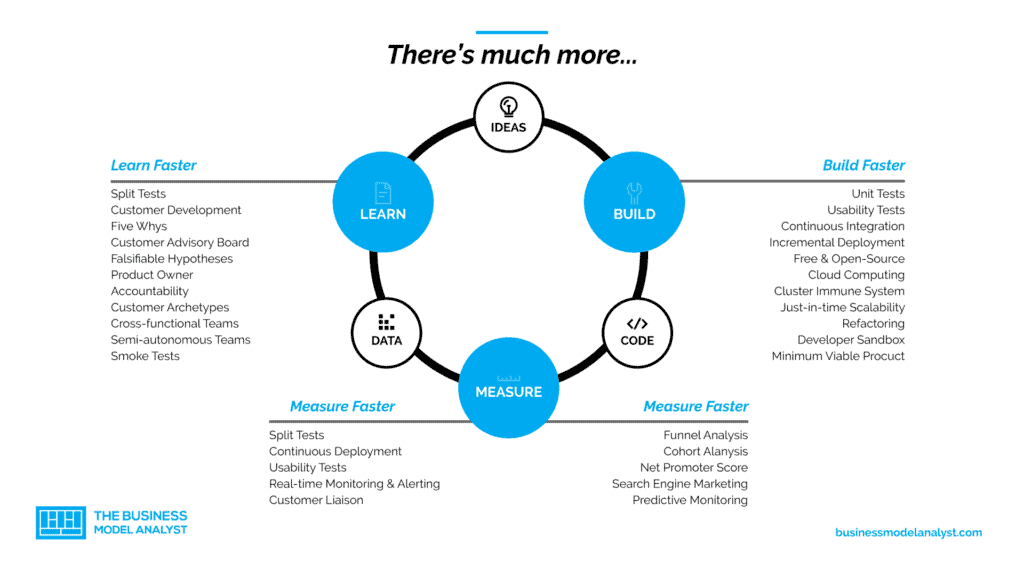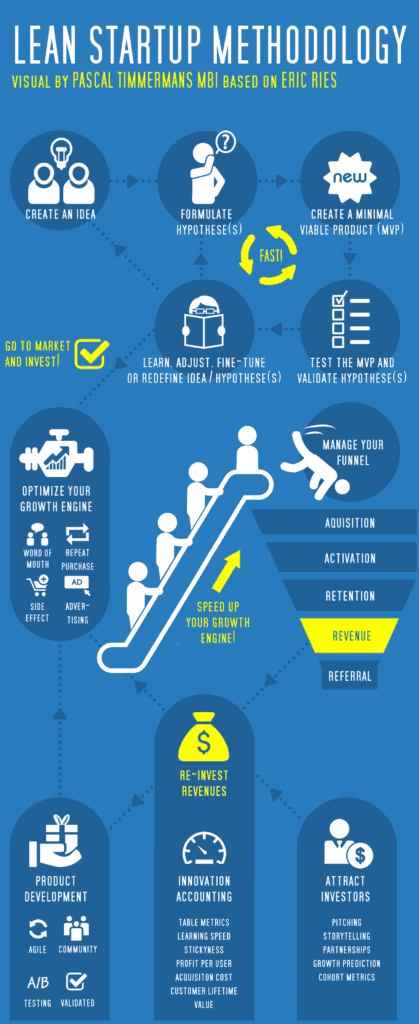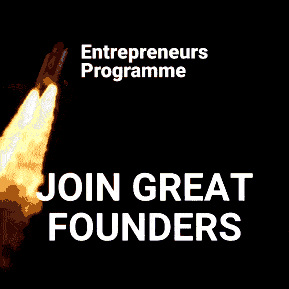Updated on 21/2/2023
Lean startup is a methodology. The Lean Startup core idea is to avoid waste of time and resources when developing a new product or service.
The term Lean Startup was coined by Eric Ries, in a book named the same. The thing is that many startups begin with a new idea that they believe people want. Then, they spend several months, sometimes years, perfecting this product without ever showing it, even in its most rudimentary form, to potential customers.
The Lean Startup Methodology
The word “lean” in this methodology, has been applied by Eric Ries, Harvard Business School researcher, towards avoiding waste. It involves identifying and eliminating waste in all the processes, from research to production.
In short, in this methodology, the company begins by getting to the market to ask the opinion of potential customers about all elements of the business model: product features, price, distribution channels and economic strategies.
With this data collected, the startup creates a minimum viable product (MVP) and ask for customer feedback as quickly as possible. Based on the answers obtained, it aims for new versions and adjusts until it finds the ideal product.

The Lean Startup cycle, known as Build-Measure-Learn, highlights the speed of a team or company to create an idea, build a minimally viable product, measure its effectiveness in the market and learn from that experience. To put it in a few words, it is the cycle to transform an idea into a product, measure the reaction to it, and decide if it is a good idea, that must remain, or a bad idea, that must be discarded.
The cycle generates innovation, as the quick iteration allows teams to identify a viable way to adjust the product, in order to optimize and improve the business model towards success. The Build-Measure-Learn is explained briefly below.
Build
The lean startup methodology begins with the creation of a minimum viable product, which refers to a service or product that has enough features to keep customers satisfied while you test your theory that the product can be successful on the market. Keep in mind that an MVP shouldn't be provided to all of your customers. Instead, you should select a small subset of customers across a range of demographics who can use your product.
This is the build component of the lean startup methodology. Since building the product is the first aspect of this methodology, it's highly recommended that you begin creating a basic product or service in the early days of your startup.
Measure
It is essential that you effectively measure the results of your minimum viable product while you continue to develop the product. The feedback that's provided to you by these customers can be used to fine-tune the product and make it more feature-rich. If you find that the very idea of your MVP isn't gaining traction with the customers that the MVP was provided to, you should be able to get rid of the basic product without having used too much of your resources.
The feedback that you receive can be measured in a variety of ways. If you are creating a business that exists solely online, you would gain feedback by providing customers with surveys and by looking at the analytics for your website to determine what you're doing well and what could be improved.
Learn
If you want to eventually create a product or service that's ready to be placed on the market, it's important that you learn from the data and feedback that you've received, which isn't always an easy thing to do.
For instance, some of the feedback that you receive might not lead to the creation of a successful product. However, this feedback is best used to identify which aspects of the product aren't working and which ones may need to be refined. If you can effectively learn from the results of the product testing, you should be able to develop a product that meets the needs of your target audience.
The video below is a review of the contents of Eric Ries' book on "The Lean Startup" and the key takeaways summarised.
The Importance of Lean Startup
The Lean Startup methodology is needed because it addresses a common problem faced by startups and entrepreneurs: uncertainty. Many new ventures fail because they invest significant time and resources in building a product or service that ultimately doesn't meet the needs of their customers. The Lean Startup methodology provides a systematic approach to minimize this risk by focusing on quickly validating assumptions and getting feedback from customers.
The Lean Startup methodology is a valuable tool for entrepreneurs and startups because it helps them focus on what really matters - building a product or service that meets the needs of their customers and has a high chance of success.
Lean Startup In Practice
Lean Startup will be new to most of your team. You’ll want to learn the responsibilities of each functional group and what the expected benefits and responsibilities will be. People tend to fear to change less than reprisal, so it’s important for everyone involved to understand that there will be hiccups in the learning phase. According to Business Model Analyst, there are certain principles of being a lean startup and some of them are as follows:
- Entrepreneurs are everywhere. You don’t have to work in a garage to be a startup.
- Entrepreneurship is about management. Your startup is not just a product, it requires management. A new form, designed specifically for your context of uncertainty.
- Validated learning. Startups must build a sustainable company. Your learning can be scientifically validated by experiments that allow you to test every element of your business.
- Minimum Viable Product (MVP). It is the minimum version of a new product, with the purpose to capture more information and learn about the needs and expectations of the end customer. That avoids efforts to create resources that are unnecessary or uninteresting.
- Innovation accounting. Yes, you also need to focus on boring things: how to measure progress, how to set goals, how to prioritize work. This requires a new type of accounting, specific to startups.
- Build-Measure-Learn. A fundamental activity of a startup is to turn ideas into products, measure how customers respond, and learn if something needs to be changed or maintained. Every successful startup should accelerate this build-measure-learn cycle.
- A/B testing. Whenever possible, make more than one version of the product available on the market. This way, you have feedback on how customers react to different product models. From the reaction to these different possibilities, you may learn what the user prefers.
- Actionable metrics. Metrics that, when triggered, provide information necessary for the organization to make decisions about the business.
Lean Startup Approach vs. Traditional Startup
There aren't many similarities between the lean methodology and the traditional methodology. While both of these approaches can be successful, they have distinctly different core principles.
The lean startup method also differentiates itself from the traditional business model when it comes to hiring. Lean startups hire workers who can learn, adapt, and work quickly while traditional businesses hire workers based on experience and ability. Further differences are summarised in the table below between the two approaches.
| Lean Startup | Traditional Startup |
| Allows you to develop a product based on the desires of the market | Begins with the creation of an extensive business plan that's used as a rigid structure for the next few years |
| Focuses on metrics like product popularity and lifetime customer value | Includes financial projections |
| Starts out with a minimum viable product to assess the reaction that customers have to the product | Involves creating products in secret where only employees and investors have any idea about the product |
| Experimentation is favoured as opposed to sticking to a strict plan | The business plan is used to obtaining funding from angel investors or VC firms |
Benefits of Lean Startup Methodology
- More productivity. By focusing on what really matters, the company’s development will happen quickly and directly. Thus, productivity grows while saving money and time.
- Cost reduction. When waste is eliminated, costs are reduced. Because you can remove steps that don’t contribute to sustainable development, thus avoiding expenses and increasing profit.
- Greater proximity to customers. When the build-measure-learn cycle is well applied, customer needs and expectations will be better known. This will provide a greater intimacy between them and your brand. And that is the first step to get loyal consumers.
Although there is no guaranteed formula for success, the Lean Startup method can be very useful for any business, as it helps the company to test ideas with its target audience in a faster and more economical way.

The Lean Startup method allows organisations to launch new digital products or services in environments with high uncertainty. High uncertainty can be created when potential customers’ problems are difficult to understand or if it is unclear how new solutions to a problem should be built.
To Conclude
In a world changing at unprecedented rates, companies have realized they must keep up with an evolving market. As Eric Ries says in his latest book The Startup Way, “In today’s marketplace of uncertainty, whoever learns fastest wins.” The principles of entrepreneurial management can be applied across many sectors and different size companies.
While the Lean Startup methodology was developed in an entrepreneurial setting, the methodology is not only restricted to startups but all companies. The process is at least as applicable to ongoing innovation and product development efforts in mature companies. In fact, the gains to be realized in this setting may be far greater as the path to the customer may be obscured by far more waste, bureaucracy, and distance than in a new entrepreneurial effort.
For a growing startup company or corporate project team, Lean Startup provides the framework to maintain the entrepreneurial spirit in the face of rapid growth.

Read more on our Startup Insights.
References






